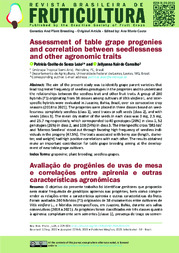Assessment of table grape progenies and correlation between seedlessness and other agronomic traits.
Assessment of table grape progenies and correlation between seedlessness and other agronomic traits.
Author(s): LEAO, P. C. de S.; CARVALHO, J. N. de
Summary: The aim of the present study was to identify grape parent varieties that lead to greater frequency of seedless genotypes in the progenies and to understand the relationships between the seedless trait and other fruit traits. A group of 200 hybrids (F1) originating from 38 crosses among cultivars of Vitis vinifera L. and inter- specific hybrids were evaluated in Juazeiro, Bahia, Brazil, over six consecutive crop seasons (2018 to 2021). The progenies were placed in three classes based on seed-lessness: completely seedless (class 1), seed traces or soft seeds (class 2), and with seeds (class 3). The mean dry matter of the seeds in each class was 0 mg, 2.3 mg, and 25.7 mg respectively, which corresponded to 40 genotypes (20%) in class 1, 52 genotypes (26%) in class 2, and 108 (54%) in class 3. The interspecific cross ?BRS Isis? and ?Marroo Seedless? stood out through favoring high frequency of seedless indi- viduals in the progeny (47.5%). The traits associated with berry size (length, diameter, and weight) had high positive correlations with each other. The results obtained make an important contribution for table grape breeding aiming at the development of new table grape cultivars.
Publication year: 2023
Types of publication: Journal article
Unit: Embrapa Semi-arid Region
Observation
Some of Embrapa's publications are published as ePub files. To read them, use or download one of the following free software options to your computer or mobile device. Android: Google Play Books; IOS: iBooks; Windows and Linux: Calibre.
Access other publications
Access the Agricultural Research Database (BDPA) to consult Embrapa's full library collection and records.
Visit Embrapa Bookstore to purchase books and other publications sold by Embrapa.

